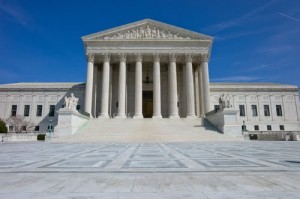 Unless you can prove you're being surveilled in a program the government keeps secret, you have no right to sue
Unless you can prove you're being surveilled in a program the government keeps secret, you have no right to sue
In a 5-4 vote, the Supreme Court on Tuesday threw out a lawsuit challenging the US government’s warrantless surveillance powers on the grounds that the plaintiffs do not have “standing.”
Justices Samuel Alito, Anthony Kennedy, Antonin Scalia, Clarence Thomas, and Chief Justice John Roberts concluded that the plaintiffs cannot sue the government for the 2008 expansion of the Foreign Intelligence Surveillance Act (FISA) because they can’t prove the law directly effects them.
The FISA Amendments Act of 2008 authorized broad, warrantless surveillance of Americans’ international communications, checked only by a secretive Foreign Intelligence Surveillance Court that doesn’t make it’s activities and procedures available to the public.





 A 12-year-old boy was among five people who died in the fiery crash of a small...
A 12-year-old boy was among five people who died in the fiery crash of a small... Quincy Jones, the multi-talented music titan whose vast legacy ranged from producing Michael Jackson’s historic “Thriller”...
Quincy Jones, the multi-talented music titan whose vast legacy ranged from producing Michael Jackson’s historic “Thriller”... Boeing machinists voted to approve a contract offer on Monday, closing the book on a bruising...
Boeing machinists voted to approve a contract offer on Monday, closing the book on a bruising... Abdi Nageeye, 35, from the Netherlands, claimed victory in the men’s race of the New York...
Abdi Nageeye, 35, from the Netherlands, claimed victory in the men’s race of the New York...






























